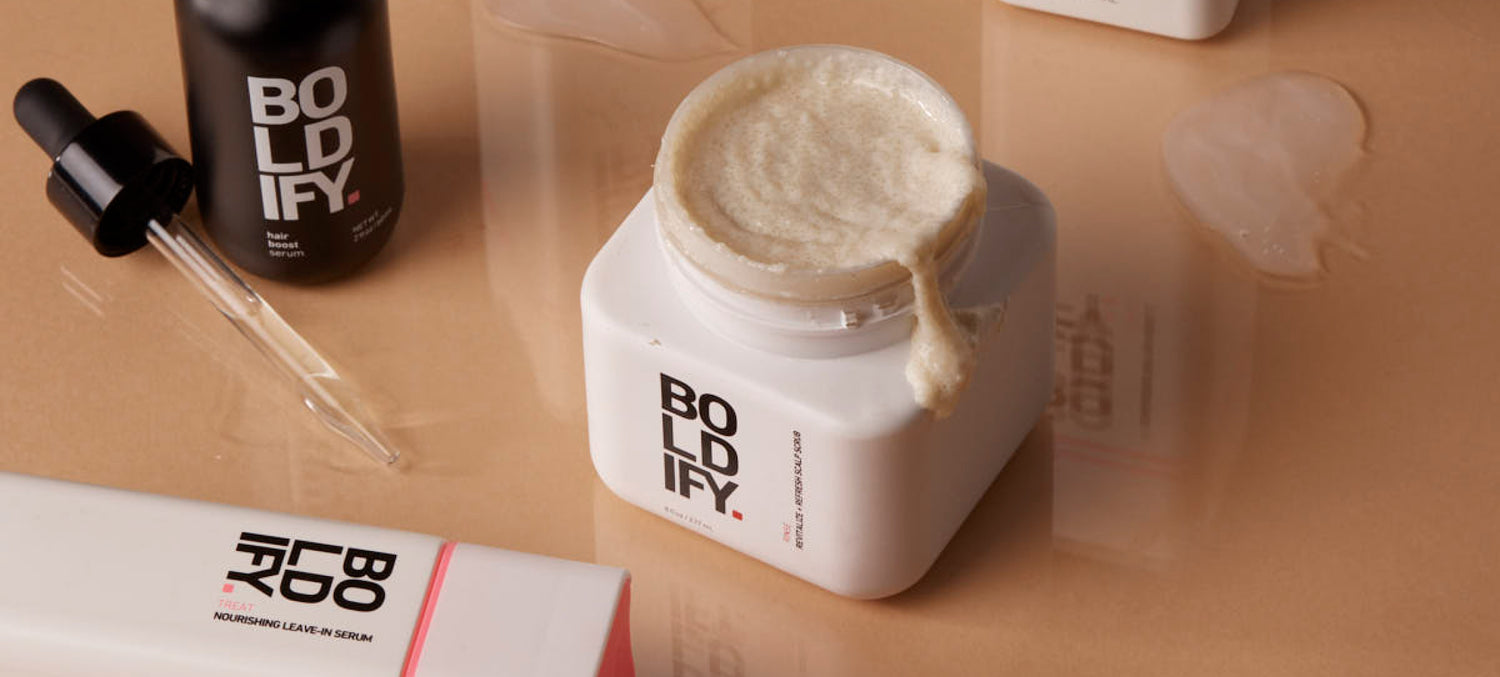Stress & Hair Loss (+ three other factors that might be thinning your hair)

If 2020 was the year you started noticing your hair begin to thin, you’re not alone. This year has been stressful to say the least, and oftentimes stress has a way of manifesting itself physically.
As if the stress and anxiety alone isn’t enough, hair loss can (sadly) be a result of major stress or trauma *cue even more stress*. While we’re not therapists, we like to consider ourselves hair therapists, which is why we’re diving into all things related to stress and hair loss, and a few other factors that might be contributing to thinning hair.
Stress And Your Tresses
If you’ve dealt with really stressful seasons before (who hasn’t?!) then you know that they can really take a toll on your body and mind. While hair loss is typically associated with genetics or aging, extremely stressful or traumatic situations – whether emotional or physical – can trigger your scalp to begin losing hair.
There are two main types of hair loss related to stress:
- Traditional, stress-induced hair loss:The most common type of hair loss, scientifically known as Telogen Effluvium, occurs when a significantly stressful event triggers large numbers of hair follicles into a “resting phase”. Some background info: your hair follicles are constantly shifting between a growing phase (the anagen phase) and a resting phase (the telogen phase). Most of the time, your hair is in the growing phase. However, when a stressful event occurs, it can quickly move a large number of hairs into the resting phase.
When this happens, hair stops growing and lies dormant and then begins to fall out two or three months later. Typically these hairs will fall out when you wash, comb, or run your fingers through your hair. The good news is, the hair follicles will reopen and your hair will begin growing back. Not so coincidentally, this usually happens once you’ve recovered from the stressful situation.
- Hair loss triggered by your immune system:
The second, less frequently seen form of stress-related hair loss is called Alopecia Areata. This condition develops when the body’s immune system (white blood cells, to be specific) begins to attack the hair follicles, resulting in hair loss. With Alopecia, the hair will fall out in rough patches within weeks. It should be said that Alopecia isn’t exclusively caused by stress! Many who have been diagnosed with Alopecia have it because of an abnormality within their immune systems.
Perhaps the one piece of good news about hair loss and stress is that your hair will almost always grow back following a stressful season! Once the stress or anxiety subsides, your mane will make its way back to growing.
Heredity
By far the most common type of hair loss is called androgenic alopecia. This is just a sciencey term for hair loss related to aging and your family’s genetic history. This type of hair loss usually occurs slowly and in really predictable patterns.
For male-pattern baldness, you’ll see a receding hairline and bald spots. For women, it’s typically thinning hair along the crown of your scalp. Unfortunately for men, hair can start to fall out as early as your mid 20’s, wherein women won’t typically begin to see any thinning until their mid-40’s.
Hormonal Changes
Though it might be difficult to detect at first, fluctuations in your hormones can attribute to hair loss. Pregnancy, menopause, thyroid issues, and even getting on or off of birth control can affect your hormones, which in turn can cause hair to fall out. If you’ve ever been pregnant, you might have found that during pregnancy your hair was at its most shiny and strong (the enhanced supply of estradiol and progesterone hormones are responsible for this), only to watch it fall out in clumps during the postpartum phase as your body’s hormones try to re-regulate after delivering your baby.Postpartum hair loss almost always grows back, but unfortunately, hair loss associated with menopause is usually irreversible unless you decide to start using hormone replacement therapy. We think aging naturally and with confidence and using tools and products to style and cover up thinning areas is the way to go.
Hair Treatments & Styles
If you’ve been a dedicated tight pony-tail wearer for the duration of your life or you get excessive hair treatments like hot oil treatments or perms done, listen up! Over time, hairstyles and treatments that are hard on your head and scalp can result in a type of hair loss called traction alopecia.If you’ve been particularly hard on your tender head over the years and you have scarring, there’s risk that the hair where the scarring has occurred won’t go back. Being gentle towards your hair is key to making sure it stays healthy and strong, so go easy on any aggressive styling or treatments and any hair that’s fallen out should grow back.
The Verdict: Give Your Hair Some Time
No matter the cause, thinning hair and hair loss is a difficult and often upsetting situation. Certainly the most difficult part of stress-related hair loss is the fact that once you realize you’re losing your hair, it feels almost impossible not to stress more!
Our best advice? Use what you’ve got at the moment to make your hair work for you.
Try styles that camouflage any patchy areas, or use products that can temporarily cover any thinning zones. Remember to take a deep breath and keep in mind that almost all hair loss conditions (and especially stress-related conditions) aren’t permanent! Your stress will pass, and your hair will grow back!


